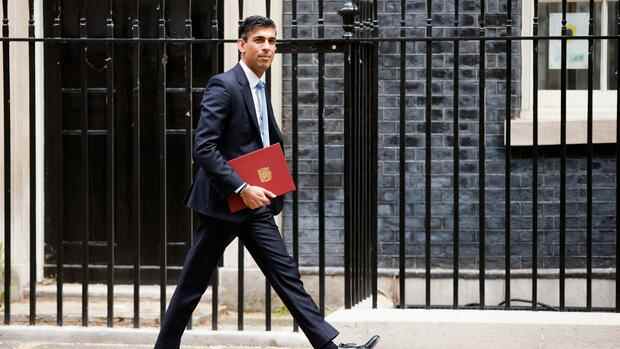In view of the rising cost of living, the British government wants to impose a special tax on energy companies and relieve consumers.
(Photo: Reuters)
London In the end, the pressure was simply too great: an inflation rate moving towards ten percent. Energy bills for more than 29 million UK homes up 50 per cent overnight in April. Gasoline prices up 14 percent in three months. Britain is experiencing the biggest increase in the cost of living since the oil crisis of the 1970s.
After much hesitation, Finance Minister Rishi Sunak has therefore announced emergency government aid worth billions, with which private households on the island are to be relieved of up to 400 pounds (471 euros). Eight million pensioners are also to be supported with £300.
There will be a further relief of £650 for certain welfare recipients. The cost of the aid package could amount to more than ten billion pounds (11.8 billion euros).
In return, Sunak wants to reverse the recently introduced state loans for private households, which were intended to curb energy costs at least temporarily.
Top jobs of the day
Find the best jobs now and
be notified by email.
“We have to make sure that support is there for those who find it too difficult and whose risks are too high,” said the Conservative politician. Sunak added: “This government will not twiddle their thumbs while our country is at risk of some being hit so hard that they will never recover.”
How the tax should be paid
The aid package is to be paid for in part by a new windfall tax of 25 percent on the crisis profits of the large energy companies. The plan, which Sunak presented to Parliament in London on Thursday, envisages that the temporary levy will flush five billion pounds (almost six billion euros) into the state coffers over the course of the coming year.
The British energy companies have largely come to terms with the special tax.
(Photo: Reuters)
The tax should be levied until energy prices return to normal levels, said the Chancellor of the Exchequer. At the same time, a subsidy would be introduced to give relief to energy companies investing their profits in the UK.
The British energy companies have largely come to terms with the special tax. BP boss Bernard Looney had previously announced that the group’s investment plans would not be affected. However, projects that go beyond this could be affected by the levy.
Italy had already introduced an excess profits tax for energy companies in March to finance a package of measures to alleviate the effects of the Ukraine war. In Germany, too, there are calls for a heavier burden on corporate profits, which are a result of the Ukraine war. The opposition left has submitted a corresponding application to the Bundestag. Green party leader Ricarda Lang has called for an excess profit tax from the traffic light coalition.
However, Federal Finance Minister Christian Lindner (FDP) said at the beginning of May: “As the finance minister responsible for tax legislation, I would like to warn against ideas of a so-called excess profit tax.” It was “not possible to identify what is excess profit and what is not”. In addition, important investment incentives would be cut.
Johnson continues to lose confidence from MPs
The new special tax has long been a subject of debate between Prime Minister Boris Johnson and Chancellor of the Exchequer Sunak. It was said from Downing Street that the tax was an investment brake and incompatible with the conservative principles of the Tories.
Johnson has now also agreed to the about-face because the corporate tax on crisis profits and the popular state aid could help him to forget his outrage at the “Partygate” scandal.
>>> Read here: Boris Johnson is now just a prime minister on call
The prime minister came under renewed criticism this week after photos showed him at celebrations at government headquarters during the lockdown at the height of the pandemic. In addition, an investigation report published this week (Gray Report) also makes him personally responsible for the violations of the corona rules.
In the wake of the report, other Conservative MPs voted to withdraw their confidence in the prime minister. Johnson’s claim that he was unaware of the celebrations at Downing Street was “simply not credible,” said MP John Baron. MP David Simmonds also called on the conservative head of government to resign. Earlier, MP Julian Sturdy Johnson had withdrawn his support.
More: Prosperity through Brexit 2.0 – Johnson wants even more distance to Europe
